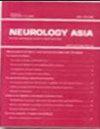平板训练对痉挛性双瘫患儿体位控制和平衡的影响:一项交叉对照研究
IF 0.3
4区 医学
Q4 CLINICAL NEUROLOGY
引用次数: 0
摘要
背景与目的:在脑瘫儿童康复项目中,跑步机训练(TT)被用于步行速度和耐力等几个目标。然而,它对姿势稳定性的影响尚未得到充分探讨。本研究的目的是研究无支撑TT对痉挛性双瘫儿童姿势控制(PC)参数和平衡的影响。方法:纳入12名根据总运动功能分类系统(GMFCS)的I-II级CP儿童。采用随机抽样方法将参与者分为两组。该研究设计为交叉研究。在第一阶段,第一组接受常规理疗康复计划(PTR),每周3次,每次45分钟,为期12周。在第二组中,以0.5km/h的速度开始的20分钟TT被添加到相同的PTR中(n=6)。在12周结束时,给予为期4周的冲洗期。在这4周之后,两组在第二阶段的治疗中又交叉了12周。所有测试均在基线以及第一阶段和第二阶段结束时进行。PC用Balance-Master计算机姿势描记术(Neurocom股份有限公司)进行评估,该方法包括改良临床感觉平衡交互作用(MCSBT)、站立体重转移(WSST)、稳定性极限(LoST)和节律性体重转移(RWST)测试。结果:两组患者在治疗前后的年龄、身体成分、GMFCS水平和痉挛程度上相似(p>0.05)。TT后,PC参数、MCSBT有显著改善:综合平衡评分(p=0.02)、重心对齐(p=0.02);WSST:对称性(p=0.03);LoST:重心后移(p=0.002),终点到达(p=0.02-0.04),最大方位(p=0.02-00.04);RWST:方向控制(p=0.02-0.04),轴上速度(p=0.02-00.04)。本文章由计算机程序翻译,如有差异,请以英文原文为准。
The effects of treadmill training on postural control and balance in children with spastic diplegic cerebral palsy: A cross-over controlled study
Background & Objective: Treadmill training (TT) is used for several targets as in walking speed and endurance in rehabilitation programs of children with cerebral palsy (CP). However, its effects on postural stability have not been fully explored. The aim of this study was to investigate the effects of unsupported TT on postural control (PC) parameters and balance in children with spastic diplegic CP.
Methods: Twelve children with CP, level I-II according to Gross-Motor-Function-Classification- System (GMFCS) were included. Participants were divided into two groups using randomized-sampling method. The study was designed as a cross-over study. In the first phase, the first group underwent routine physiotherapy-rehabilitation program (PTR) 3 sessions/week, 45 minutes per session, for 12 weeks. In the second group, 20 minutes of TT starting with 0.5 km/h speed, was added to the same PTR (n=6). At the end of 12 week, 4-week-long wash-out period was given. After this 4 weeks period, both groups crossed-over for another 12 weeks at the second phase of therapy. All tests was applied at baseline and at end of the first and second phases. PC was evaluated with Balance-Master computerized posturography (Neurocom Inc.) which consisted of tests of modified-clinical-sensory- balance-interaction (MCSBT), weight-shifting-in-standing (WSST), limits-of-stability (LoST) and rhythmic-weight-shifting (RWST).
Results: The two groups were similar in age, body composition, GMFCS Levels and spasticity levels before the treatment and after the wash-period (p>0,05). After TT, there were significant improvements in PC parameters, MCSBT: composite-balance-score (p=0.02), center of gravity alignment (p=0.02); WSST: symmetry (p=0.03); LoST: backward weight-shifting (p=0,02), end point reaching (p=0.02-0.04), maximum-orientation (p=0.02-0.04); RWST: direction- control (p=0.02-0.04), on-axis-velocity (p=0.02-0.04).
Conclusion: Including TT in PTR treatment program can enhance PC and balance in children with CP.
求助全文
通过发布文献求助,成功后即可免费获取论文全文。
去求助
来源期刊

Neurology Asia
CLINICAL NEUROLOGY-
CiteScore
0.30
自引率
0.00%
发文量
76
审稿时长
>0 weeks
期刊介绍:
Neurology Asia (ISSN 1823-6138), previously known as Neurological Journal of South East Asia (ISSN 1394-780X), is the official journal of the ASEAN Neurological Association (ASNA), Asian & Oceanian Association of Neurology (AOAN), and the Asian & Oceanian Child Neurology Association. The primary purpose is to publish the results of study and research in neurology, with emphasis to neurological diseases occurring primarily in Asia, aspects of the diseases peculiar to Asia, and practices of neurology in Asia (Asian neurology).
 求助内容:
求助内容: 应助结果提醒方式:
应助结果提醒方式:


